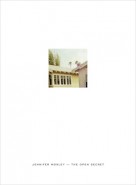
Book Review: The Open Secret by Jennifer Moxley
The Open Secret
Poems by Jennifer Moxley
Flood Editions, August 2014
ISBN-13:0 978-0983889397
$15.95; 96pp.
Reviewed by Alyse Bensel
The Open Secret moves from fragmented lyric to introspective narrative in an attempt to clarify the process and perspective associated with what it means to be a poet. In the collection’s title poem, Jennifer Moxley shares the recipe for “The Open Secret” that yields “boundless servings” for the reader. Its abstracted ingredients are shaped through the ritual of instruction: “Lightly toast dreamlike sense, intuition, and apprehension in a dry skillet until fragrant, then grind in a mortar.” Finally, we are asked to “place all ingredients within the moving image of eternity and stir gently.” As a venture in articulating the poetic impulse, the poem proves to not only lay bare the poet’s instinct but to help the reader understand the limitless multiplicity at work in this labor.
In calling the reader’s attention to the act of writing itself through this reflective motion, Moxley asks us to participate within the conceptual framework of the poem itself. In “Evacuations,” a thought experiment where the speaker, in the act of writing the poem, always tries to stay in the present and not stay in the past, the reader is privy to the thoughts that try and derail the project, as the poem is caught between thoughts of future and past. Here the speaker intones “The present is resistance, punctured every third day / by a minor enthusiasm. The anticipation of a really / delicious steak. A filet mignon.” Continuously extrapolated from the initial idea, thoughts turn to the poet, who “starts / counting in order to show the ‘active’ reader / that counting is intentional and structure meaningful, / and both are true.” Even this desire for the active in the present keeps on pushing back, when the speaker notes “I’ve been tricked / by the past, making it out to be a really great time / with good values.” Ever aware of the process at work, and of the poem as process, Moxley, it seems, wishes to imbue the poem not with its creation intact.
However, the collection begins not with these lengthy introspections but with the flitting lyric. These poems gather strength from fragmented line breaks and short lines that increase their movement. The opening poem, “There Is A Birdsong at the Root of Poetry” muses on the apparently familiar topic of birdsong. Yet this song is focused not on the ease of its song but of the effort “out of which / the bird wings stiffly just / rigid as / rhubarb leaf.” The speaker then implores the reader “should you / listen you will hear / the wasted strains of an underground song” that attempts to rise of this bird. Its mortality is always on display, sought out by those who can really listen. In wanting to keep the song in motion, Moxley presses forward, calling the reader and the muses into the fray.
Alyse Bensel is the author of two chapbooks, Not of Their Own Making (Dancing Girl Press, 2014) and Shift (Plan B Press, 2012). Her poetry has recently appeared in Mid-American Review, Heavy Feather Review, and Ruminate, among others. She serves as the Book Review Editor at The Los Angeles Review and Co-Editor of Beecher’s.

